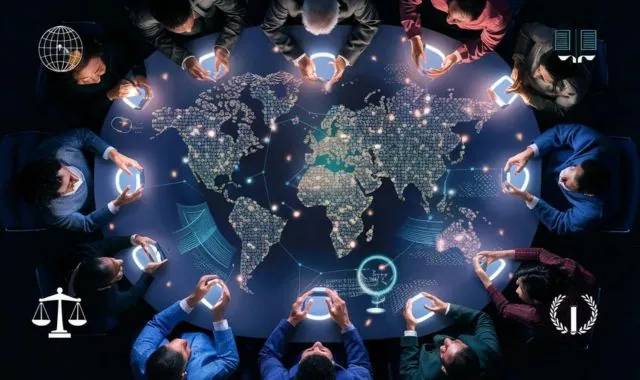Physical Address
304 North Cardinal St.
Dorchester Center, MA 02124

A Guide to Technology Ethics grapples with the moral dilemmas of technology. Privacy, bias in algorithms, and social media’s influence are key issues. Stakeholders like tech companies, governments, and users all have a role to play in building a future where technology benefits humanity. This requires ethical frameworks, education, and responsible use.

Technology ethics is more than just the latest gadgets and apps. It’s the critical examination of the moral implications surrounding the development, use, and impact of technology. As our technological power grows, so too does the need for ethical considerations to ensure it serves humanity, not the other way around.
The rapid pace of technological advancement necessitates proactive discussions about ethics. We can’t afford to wait for problems to arise before addressing them. By anticipating potential pitfalls and fostering open dialogue, we can shape technology’s future for the better.
The vast amount of data collected about our online activities raises privacy concerns. Balancing the benefits of data-driven innovation with user privacy is a crucial tightrope walk.
Deepfakes, hyper-realistic manipulated videos, pose a significant threat. They can erode trust in information and sow discord. Developing methods to detect and mitigate deepfakes is critical.
Algorithms, the automated decision-making tools that power many online platforms, can perpetuate bias. This can have unfair consequences, such as discriminatory hiring practices. Ensuring fairness and transparency in algorithms is paramount.
The lack of transparency surrounding algorithms raises concerns about accountability. Understanding who controls the code and how it makes decisions is essential for ensuring responsible development and use.
The rise of automation raises anxieties about job displacement. However, AI can also create new opportunities. Focus should shift to preparing for a future where humans and AI collaborate effectively.
The true potential of AI lies in its ability to augment human capabilities. By fostering collaboration between humans and AI, we can achieve breakthroughs that wouldn’t be possible otherwise.
Social media algorithms can create echo chambers, where users are only exposed to information that reinforces their existing beliefs. This can lead to polarization and a decline in critical thinking. Mitigating algorithmic bias is essential for promoting diverse viewpoints.
The spread of misinformation and disinformation on social media platforms erodes trust and undermines democracy. Encouraging critical thinking skills and promoting media literacy are crucial tools in this fight.

Technology companies wield immense power. They have a responsibility to develop ethical frameworks, prioritize user privacy, and be transparent about data collection practices.
Governments play a vital role in establishing regulations that promote ethical tech development and use. These regulations should balance innovation with safeguards for individual rights and societal well-being.
Individual users also have a responsibility. By understanding how technology works, critically evaluating information, and demanding transparency from companies and governments, we can all be agents of positive change.
Creating comprehensive ethical frameworks for technology development and use is essential. These frameworks should consider the potential impacts on society, privacy, and equality.
Educating the public about technology ethics is crucial. Equipping people with critical thinking skills and fostering media literacy empowers them to make informed choices online.
Critical thinking skills are the user’s superpower in the digital age. By questioning information, seeking diverse perspectives, and understanding how technology works, we can become responsible digital citizens.

Technology has the potential to be a powerful force for good. By fostering open dialogue, prioritizing ethics, and working together as stakeholders, we can shape a future where technology serves humanity, not the other way around. This requires ongoing collaboration, adaptation, and a commitment to using technology for the betterment of our world. As we navigate the complexities of the digital age, let’s remember that technology is a tool. The power lies in our hands to wield it responsibly and ethically, ensuring a future where innovation empowers humanity to thrive.
Technology ethics is the study of the moral implications of technology. It asks questions about how technology is developed, used, and impacts society.
Technology is evolving rapidly, and it’s crucial to consider the potential downsides alongside the benefits. Tech ethics helps us ensure technology serves humanity in a positive way.
Privacy concerns, bias in algorithms, the spread of misinformation on social media, and the impact of AI on jobs are all important areas of discussion in tech ethics.
Tech companies, governments, and individual users all have a role to play. Companies need to develop ethical frameworks and be transparent. Governments need to set regulations. Users can be responsible digital citizens by being critical of information and demanding accountability.
Developing ethical frameworks, educating the public about tech issues, and encouraging critical thinking skills are all important steps towards a more ethical tech future.